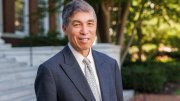Nearly one month into autumn, Harvard’s principal professional schools today began to announce that spring teaching and learning will for the most part continue online, following the model that has been in place during the current semester. Plans for the College will be unveiled later in the fall—but preliminary decisions have been made about how to conduct reunions and associated alumni meetings come next spring.
If past practice holds, schools will make individual announcements throughout the day. Check back here for updates; they will be posted as soon as they become available. Schools reporting their plans so far include:
Harvard Graduate School of Design: Dean Sarah M. Whiting advised her community this morning (emphases added) that “After exhaustive scenario planning, I write to you today to share the decision that the GSD will continue with remote teaching, following the existing academic calendar, with no building access through the spring 2021 semester. GSD staff who are able to work from home should plan to continue to do so.” She cited “the rising infection rate in Cambridge, Somerville, and the rest of the Boston area; the challenge of making the single space of the trays [GSD’s tiered studio area] truly safe; and the continued closure of U.S. embassies and consulates worldwide, making it impossible for many of our international students to obtain visas.”
Whiting also noted, “We have doubled-down on investing in efforts to support how we teach, learn, and organize ourselves and exist as a community online, and over the coming months we will be rolling out additional initiatives aimed at moving the school further in that direction.” As examples, she listed expanded digitization of Loeb Library resources, virtual “site visits” for design studios, socially distanced gatherings of students and alumni worldwide, and tools to enable members of the community share their activities schoolwide at any time.”
Students who wish to apply for a leave of absence must do so by November 2, and if the number of students on leave exceeds places available next academic year when a new cohort enters the schools, returning students may be lotteried back into places across the next two academic years.
Radcliffe Institute for Advanced Study. The institute this morning posted guidance updating its spring 2020 shift to “primarily” virtual operations: “Our work has continued unabated but has been reimagined to safeguard the health and well-being of our community.” Given continuing public-health concerns about the risks of “convening large numbers of people, as well as the possibility of a resurgence of infections in the coming months…Radcliffe Institute activities will continue to be primarily virtual through the end of the 2020-2021 academic year.” That includes public events and private programs, student fellowships and other activities, the Radcliffe Fellowships, and research services at the Schlesinger Library.
Harvard Divinity School. [Updated October 20, 2020, at 12:25 p.m.]: Dean David N. Hempton, taking note of the risk of resurgent infections, wrote to the community that “Given this uncertainty, along with HDS's small classroom size—particularly while Swartz Hall is under renovation—and the challenges this presents to physically distance, HDS will conduct all spring 2021 courses online. In so doing, the School seeks to maximize community safety and to allow students to make informed plans for travel, living arrangements, and enrollment.” Building on work the community has done in the fall term, he continued, “We are deeply committed to creating a spring semester that will serve our students' educational needs and aspirations at the highest possible level. With steps such as smaller class sizes, tuition on a per-course basis and flexible course loads, technological aides, and out-of-class virtual gathering and study opportunities, HDS faculty and staff continue to do all in their power to recreate online the individualized instruction and community experience that are a hallmark of our educational mission.”
Harvard Kennedy School. [Updated October 20, 2020, 1:20 p.m.]: Dean Douglas Elmendorf wrote to students, faculty, staff and fellows that “our goal has been to bring students back to campus as much as possible while protecting the health of the Kennedy School and Harvard community and doing our part to help protect the health of the Greater Boston community.” In that context, however, things may be slightly liberalized in the spring term, largely to accommodate the needs of its highly international student body, thus: “[W]e plan to offer a small number of in-person classes for a limited number of students, and we plan to let all interested students spend modest amounts of time studying and interacting on campus apart from classes. However, there are crucial caveats: Most classes will continue to occur remotely. Moreover, we may need to shift the planned in-person classes to a remote basis and to cancel or reduce other planned campus access if health conditions worsen at the Kennedy School or in the Boston area.”
Accordingly, he continued, the school plans a “targeted-hybrid” approach, available to (emphasis added) “a limited number of students will be able to take a small number of courses with substantial in-person elements. We plan to reserve access to those class slots for students from outside the United States who do not currently hold visas [but can obtain them] and who choose to come to campus—responding to concerns expressed by many of our non-U.S. students, and also by many of our U.S. students on behalf of their friends and colleagues from other countries.” Other students cannot access in-person classes, but will be given priority access to campus outside of classes, while the school continues to explore “safe and feasible ways to increase in-person learning.”
The complex course offerings, differentiated among the school’s masters’ degree programs (detailed here), are designed, Elmendorf wrote, to “meet the in-person study requirements in the U.S. federal regulations that govern F-1 and J-1 visas for students who do not yet have them. However, visa issuance and admission into the United States are not under the control of the University, and the risks of visa noncompliance are borne primarily by the individual applicants. Moreover, some aspects of current visa rules are scheduled to expire on December 31”—an indication of the difficulties the United States has recently imposed on international students who wish to study here.
Executive education will remain fully remote for the spring semester. And as all in-person elements of the academic program are subject to being converted to remote instruction if health conditions deteriorate, the lives and status of those students aiming to enroll from abroad may be subject to further, sudden disruption. Similarly, students’ non-course access to campus depends on how many want to take advantage of the options, public-health conditions, staffing availability, and other matters.
Harvard T.H. Chan School of Public Health. [Updated October 20, 2020, at 3:00 p.m.]: Dean Michelle Williams announced that the school “has made the difficult decision to extend remote learning through WinterSession and the 2021 spring semester (Spring1 and Spring2). Unfortunately, the pandemic continues, and cases are rising in Massachusetts, across the country, and around the world. The risks and uncertainty are simply too great to have everyone back on campus.” She cited a continuation of efforts begun during the fall to provide “augmented teaching support for winter and spring courses, such as increased TA and instructional design assistance. Further, the School’s Committee on Educational Policy has decided that we will continue to offer opt-in pass/fail for grades (with PhD students guided by GSAS’s grading policy).”
Harvard Law School. [Updated October 20, 2020, at 4:25 p.m.]: Dean John Manning wrote to students, observing, “Though we had very much hoped to be able to resume teaching and learning on campus, we have with great disappointment concluded that it is neither prudent nor equitable for us to resume in-person instruction. We miss seeing you all in person tremendously. And we understand and regret that today’s decision will land hard with many of you.”
Noting that “our faculty have found creative and effective ways to adapt online practices to the distinctive pedagogy of law school; that our students have been present and engaged in the classroom and clinical experience; and that classes and clinics are generally going well,” he continued, “[W]e have concluded that pedagogical considerations not only justify, but favor, the continuation of online instruction at present,” rather than some hybrid option that would be inferior in the school’s Socratic-method classes. Such classes would, moreover, be inequitable, in offering different experiences among those present and those participating remotely.
To enhance online learning, the school is adapting classes to reflect the time zones in which students are living; providing additional opportunities for small-group interactions with teachers and among students (through reading and writing groups, and online coffee and lunch get-togethers—online, with the school footing the food bill); augmenting the Teaching Fellow cohort; providing support for dependent care, technology assistance, textbook shipping, and printing of course packs; and other steps.
Graduate School of Arts and Sciences. [Updated October 23, 2020, 9:30 a.m.]: Dean Emma Dench has reaffirmed that graduate programs are required “to conduct all classroom teaching and learning remotely, including cohort-building activities, for the fall 2020 and spring 2021 terms. Remote instruction is still in effect for the spring term.” The graduate school has also extended financial support to upper-level Ph.D. students to defray health and facilities fees, and is extending “visiting fellow” appointments, through the spring term of 2022, to November 2020 and March 2021 graduates who do not have employment lined up or whose employment is delayed; the appointments confer library and other privileges to support their continuing research, provide access to health insurance at student rates, and maintain a Harvard affiliation and email address during job searches.
The College, and Reunions
The Faculty of Arts and Sciences (FAS)—which includes Harvard College, the largest cohort of students housed in University residences—is expected to announce its plans in December. Undergraduates now in residence (largely first-years, plus some others who could not pursue their academic work from home) are required to leave campus by November 22, and will not return for the traditional post-Thanksgiving reading and examination periods (which are being conducted remotely). If FAS determines it can stick with the options it outlined last July 6, the first-year students would remain home for the spring term, with seniors coming back to campus to complete their studies, along with the few hundred other students who are granted exceptions to be in Cambridge.
But the details will depend importantly on prevailing public-health considerations, progress toward vaccines, and other factors. (The shape of the semester could well change, too: it would not be surprising to see the elimination of spring recess and other measures to contain travel and exposure: steps that have been announced by institutions like Yale and Carnegie Mellon.)
It is already clear that the reunion schedule will be altered. Harvard Alumni Association executive director Philip Lovejoy made it known last week that if the HAA’s annual meeting and reunions can take place in person (a decision expected in late winter; both had to be canceled last May), they will be hosted “at a time when students are not on campus” to assure adequate de-densification and social distancing. That is, if there is an in-person Commencement, it would be separated from the alumni association meeting and reunions.
As Lovejoy put it, “[T]he important and enduring traditions of College Reunions and the Annual Meeting are deeply interconnected. Therefore, in either an in-person or virtual scenario, these programs would still take place together—and both would be moved to the first week of June if held in person.” Although the timing could change, he continued, “[W]e would still plan to preserve many of the time-honored traditions of the program like the alumni processions, celebrating reunion classes, recognizing the Harvard Medalists, and hearing from the Harvard and HAA presidents.” If they cannot be safely held in person, both will be hosted virtually.
The Professional Schools in Context
The professional-school announcements lacked any element of dramatic surprise:
- Coronavirus cases are on the rise in a majority of U.S. states (41 as of October 15), with several recording their highest weekly counts since the pandemic emerged last March—and nationwide, the number of cases exceeded 8 million at mid month, as deaths exceeded 215,000.
- The New York Times’s campus coronavirus counter has logged more than 178,000 cases at 1,400-plus institutions, most of which have not installed extensive (and expensive) testing and tracing regimens like those in place at Harvard (where those and manifold other precautions have proven extremely effective).
- And across much of Europe, the current situation appears even more adverse than it is in the United States, making it nearly impossible for foreign students to be in residence.
The schools and their faculties seem largely to have adapted to remote instruction, and continue to invest in improving pedagogy online. (See “School Goes Remote” for a perspective on online undergraduate teaching and learning.)
Harvard Business School is offering hybrid classes, with physical barriers and enrollment limitations that reduce capacity in its teaching sharply. Harvard Medical School is pursuing its model of first-year remote instruction and in-person clinical rotations for its other M.D. students. Harvard Medical School updated October 26, 2020, at 8:00 A.M.: The Medical School will invite first-year students back to campus for January and spring-semester courses, joining upper-class students who have been present for clinical rotations since last summer. And the Graduate School of Education announced last summer that its instruction would be remote for this entire academic year.
Opting for the remote model and instituting strict social-distancing measures for those community members who are in residence have obviously played a central role in maintaining public health on campus. Given the warnings by Harvard scientists, among others, that other coronaviruses are particularly dangerous during the winter months when colder weather drives people indoors, and possible complications from the advent of seasonal flu, it would be extraordinarily surprising if a major faculty resumed residential operation come late January or early February.
The University’s website for updated information on school plans is accessible here.









